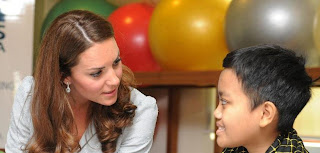Can you teach someone to care? This could be the shortest blog so far because the answer is no. People come in all shapes and sizes but you can roughly divide them into two groups; those with a warm heart and those without. It’s a kindness thing, a basic ability to empathise and if you haven’t got it, no amount of teaching is going to help. So should we all just give up now? Again, no, keep reading.
Whatever the headlines, it’s not just
nurses. If you go into a shop you are most likely to be served by someone who’s
competent and friendly but there are the shop assistants who carry on talking
about their night out when they serve you and those who simply ignore you. No
big deal, but transfer this into a caring profession and the people who
struggle to understand the needs of others have a much bigger impact.
The chief nursing officer for England, Jane
Cummings, is right to say that there is too much poor care in our hospitals but
is it a wider problem? Could it be a symptom of a much bigger issue in our
society? Like most big, national
organisations, the culture of the NHS is a reflection of our culture as a whole
so it shouldn’t surprise us that some care staff are failing to care.
Compassion is becoming an endangered quality. We notice it more when we’re
thrust into the intense and unfamiliar environment of a hospital and where
simple acts of care and kindness can make such a big difference to the lives of
patients and those around them.
Let’s not fall into the tabloid trap that
all nurses are “angels” but equally, not all patients or families are easily
definable either. If we want to understand this issue then we also need to
shine a light on the often unmentioned difficulties facing health
professionals. Anyone working in the NHS can tell you about toys stolen from
children’s wards, even bedding or curtains being taken from family areas. Then
there’s the elderly relative or even a sick child being dumped at Christmas or
holiday time because no one wants the stress of looking after them.
Yes, it
breaks my heart too and yes it is extremely rare but it happens. In 21st
century “caring” Britain nurses also regularly face people who are drunk and
aggressive, people who are dishonest, people who are trying to play the system
for everything they can get. And then there are those with dementia and mental
health problems who deserve every single ounce of kindness and compassion but
who can be challenging to deal with and the lack of training in this area is
already well documented. It’s not a pretty picture but if we’re to stand even
half a chance of solving the crisis of care in our hospitals we need to have a
very real debate, not one that paints hospitals, and modern life, in
rose-tinted nostalgia.
The good news is that most of us have a
heart and although you can’t teach care, with good training and proper support
we can nurture kindness and balance compassion and competence alongside
clinical excellence and care.
Improving care comes done to a simple
battle between good and bad but it requires a much less simple ability to empathise
in the face of difficulty, get your hands dirty, stick your neck out and do
what’s right, even when time, and the times we live in, are against you. If we
can teach right from wrong, teach strength and courage over the easy way out,
then we can address the care deficit. If we can find the nursing leadership to
deliver that, their next task is to look at the rest of our society.
Links










